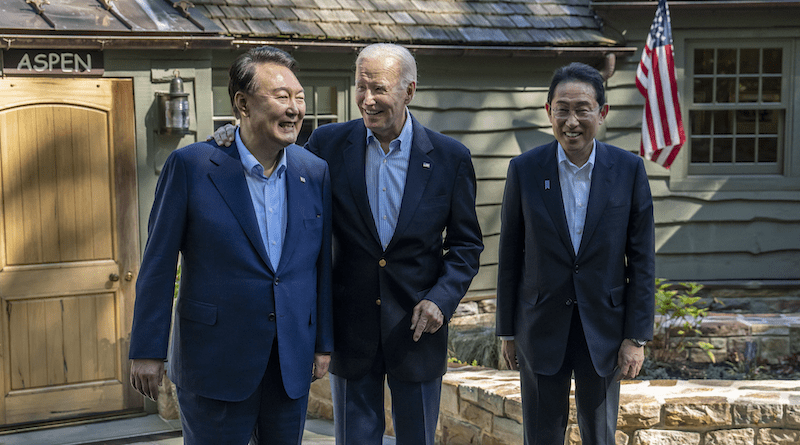Japan–South Korea–US Relations Thawed, But Not Warm Enough – Analysis
By Daniel Sneider
The 18 August 2023 summit that brought together the leaders of Japan, South Korea and the United States at Camp David was rightly hailed as a breakthrough moment in consolidating trilateral security ties, especially after years of near-frozen relations.
US officials stressed the importance of creating enduring institutions and structures among the three countries. These institutions could be nested within other Indo-Pacific regional creations like the Quadrilateral Security Dialogue, the newer AUKUS security pact and cooperation with the Philippines.
The summit documents offered both a vision of partnership and a variety of practical agreements. They include everything from annual leadership summits to meetings at the ministerial and official levels to coordinate on economic security, supply chains and cyber security, as well as classic security steps such as joint military exercises.
Perhaps the most striking outcome of this summit was the assertion of shared security interests that bind Japan and South Korea and their alliances with the United States. While it falls short of a collective security agreement, the two-paragraph ‘commitment to consult’ on responses to ‘regional challenges, provocations, and threats affecting our collective interests and security’ was itself a stunning achievement.
Those ‘challenges’ and ‘threats’ were made clear, beginning with the most obvious one that unites the three — North Korea. This was followed by Russia’s assault on the international order in Ukraine and, in a somewhat muted fashion, China.
But the high-flown rhetoric trumpeting a new ‘alliance’ conceals political realities that were swept under the rug at Camp David. All three leaders face serious challenges at home that undercut the promises made at the summit.
Within mere days, the limits of the partnership were put on display with the discharge of radioactively tainted water from Japan’s disabled Fukushima Daiichi power plant. The beginning of the release on 24 August has already created serious political problems in both South Korea and Japan.
South Korean President Yoon Suk Yeol, in his determination to improve relations with Tokyo, offered sweeping support for the decision to begin the release of stored water. But he faces overwhelming disapproval for this decision in South Korean polls. The Fukushima issue likely increases the chance of Yoon’s defeat in 2024’s parliamentary elections, an outcome that could make Yoon and his administration early lame ducks.
Back in Tokyo, Prime Minister Fumio Kishida is waiting for a bump from the Camp David summit. But he is experiencing a deepening slide in opinion polls. The Fukushima release faces opposition within Japan, including from fishermen and others worried about boycotts of Japanese products in China and South Korea. Talk of an early parliamentary election in Japan, intended to consolidate Kishida’s claim to long-term leadership, is now on hold.
In Washington, President Joe Biden is already embroiled in an election campaign that threatens to bring Donald Trump and his isolationist views back to power. The Camp David summit was barely noticed amid the constant flow of domestic political news, though it mostly received welcome praise in the media.
Senior US officials are aware of the fragility of the progress gained and the danger of overselling the outcomes. In a post-summit briefing, National Security Coordinator for the Indo-Pacific Kurt Campbell, who is widely acknowledged as the architect of the summit, was notably cautious. He emphasised that ‘we cannot get ahead of the political context that each of us deals with’.
Political constraints were more evident in the brief press conference that concluded the summit than in the official documents. The three leaders offered upbeat summaries of the agreements. But the reporters present, one from each country, pushed back.
The US reporter asked how confident allies can be in Washington’s pledges of extended deterrence against nuclear threats from North Korea when Trump, who may return to office, was ready to withdraw from the Korean peninsula. He asked Yoon how much confidence Japan and the United States can have in rapprochement when most South Koreans disapprove of the handling of wartime justice issues. And he asked Kishida what he would tell Japanese people who oppose ‘an economic Cold War with China’.
The South Korean reporter was even sharper, describing Japan’s response to Yoon’s efforts at mending relations as ‘passive efforts to resolve our issues that still remain’. Meanwhile, the Japanese reporter raised the issue of the Fukushima release.
The answers were at best evasive, mostly content to repeat bland pledges of cooperation and partnership. But Kishida notably took the opportunity to soften any impression that China was their common foe, referring to Japan’s efforts to maintain ‘positive momentum’ in their relations.
The most glaring unaddressed question is the lack of a regional economic strategy to accompany the security focus. Talks of supply chain coordination and cooperation on technology research skilfully sidestepped the lack of consensus on how to deal with China and technology transfer. Missing was any discussion of the most obvious way to counter China’s claim to economic leadership — the expansion of the Comprehensive and Progressive Agreement for Trans-Pacific Partnership to include South Korea.
Imprisoned by US domestic politics, the White House is unable to give substance to this emergent partnership. It will instead try to offer a different version of the Indo-Pacific Economic Framework when the Asia-Pacific Economic Cooperation conference gathers in San Francisco in November 2023. But that may merely offer yet another glimpse of how political survival, in all three countries, triumphs over strategic necessity.
About the author: Daniel Sneider is Lecturer of International Policy and East Asian Studies at Stanford University and a Non-Resident Distinguished Fellow at the Korea Economic Institute.
Source: This article was published by East Asia Forum

